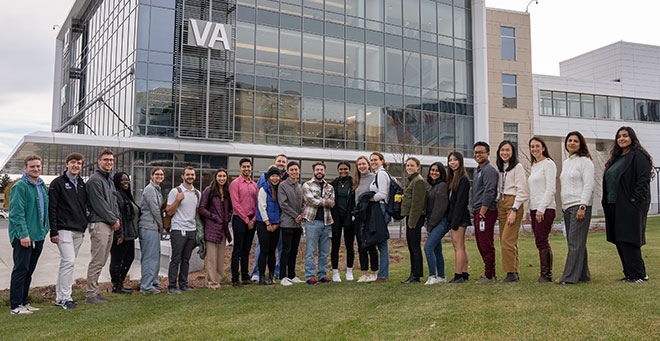
Second-year students in the T.H. Chan School of Medicine learning about the unique health care needs of military veterans through a new UMass Chan Medical School initiative with the Veterans Affairs clinic on campus said learning about the veteran experience is crucial to developing their patient–doctor communication skills.
“Veterans are members of the community that I hope to take care of one day,” said medical student Avery Pullman, who is taking part in the veterans’ health training. “It’s a population that needs a lot of care and it’s important that we’re all receiving this training. I’m glad I had the opportunity to learn more about the VA system, meet with veterans and hear their stories about their experiences in health care and find out what we can do better.”
The intensive training opportunities are being held at the community-based outpatient clinic operated by the VA Central Western Massachusetts Healthcare System, and include a tour of the VA facility, practice interviews with veterans and speaking directly with health care providers who care for veterans.
The training represents the first time UMass Chan second-year medical students are required to attend a learning session at the VA clinic. The sessions align with UMass Chan’s institutional goal to support the training of future physicians and nurses to ensure exceptional health care for those who have served.
Valerie Marteeny, a research coordinator and a Navy veteran, was one of the veterans who spoke with students.
“This training is important, and I encourage the students to be sensitive to veterans’ issues. It’s a different community than they’ve worked with up to this point and to learn the ins and outs of the veteran experience is a really great opportunity for them,” Marteeny said.
Medical student Liana Brooks said interviewing veterans during the training will help her develop stronger communication skills with veterans and other patients who are dealing with trauma.
Brooks said, “Veterans are susceptible to comorbidities and medical issues because of either being in the service or not receiving proper medical care or mental health services after serving. Given what I want to do in the future as a physician, it was important for us to hear about their needs, and we learned what types of questions to ask directly related to the trauma they may have experienced.”


